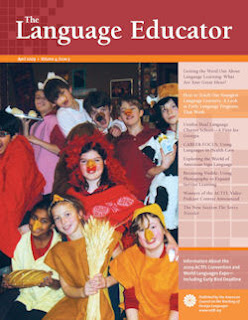Journal Review for Spanish Community Service Learning: The Language Educator 4.3
 by Ann Abbott
by Ann AbbottAnother issue of "The Language Educator," another cache of very useful information. I'll comment on the different pieces in separate posts.
1. On-line tools for learning Spanish
http://www.scola.org/ The building where I work used to have a television set above the elevators that broadcast SCOLA(with newsbroadcasts from many languages and countries) throughout the day. They took it down, and it is true that it looked outdated--the Hummer-sized tv set hanging above your head--but it was a visual reminder of what our building, the Foreign Languages Building, was all about. If you walk into the newest buildings on campus--the Institute for Genomic Biology and the Business Instructional Facility--they have flat screen tvs that greet everyone who enteres with constant information about what they are about, their brand. But I digress! SCOLA may seem old-school, but don't forget it as a good resource for advanced language learners. '
http://spanish-podcast.com/ "Voices en espanol." I already knew about this blog, but it was nice to see it mentioned again. I subscribed to the site so I can be sure to catch up with its latest content--interesting blog posts and great podcasts. Yes, most of the Spanish is from Spain, but I always tell my students that they should just concentrate on improving their Spanish of any variety; then it will be easier to pick up on the particularities of the varieties they encounter most often in the community.
http://www.rojasspanishteachers.com/ While I was at Voices en espanol, I clicked on the link for "La Casa Rojas." I know that our students usually don't want to (and in some cases can't) pay for language-learning tools on the web, but this site is full of great information and good writing. While cultural information in Spanish textbooks tends to concentrate almost exclusively on literary texts and works of art, students want to know more about daily life and cultural practices in Spanish-speaking countries. This site has that information. Its categories include: dia cotidiano; festivales/tradiciones; gastronomia; politica/historia; reflexiones linguisticas. (I'm going to come back and put in the accents when I'm on a different computer. Argh.)
http://www.flashcardexchange.com/ Memorizing decontextualized lists of vocabulary words is not a good investment of a Spanish CSL student's time, in my opinion. Still, since these sets of Spanish flashcards are tagged, you can find words that are related to a topic that you are interested in. In my opinion, you're better of jotting down words you hear in the community and making your own flash cards. But if you like using flash cards and think this might help, give it a try.
www.rne.es/page?HOME_RNE Again, our Spanish CSL students probably aren't going to be encountering people in the community with Spanish accents and phrasings. Still, it's good practice to listen to the radio and test your "ear" so I think Spain's Radio Nacional website provides good practice for our students. Since I'm not familiar with all their programs, the site is very busy and overwhelming for me. I simply click on "Radio Nacional en directo" and listen to whatever comes on. I would also recommend clicking on "Podcasts" and choosing from the topics covered there. Some that might be related to work that our students do in the community include "A su salud," "Al son de America" and "Alimento y salud."



Comments
Post a Comment